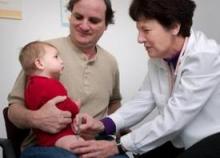STANFORD, CALIF. – An expert panel is debating a possible change in federal immunization recommendations to lower the age of routine first measles vaccination to 6 months for infants who will be traveling to areas where measles is a problem.
The Centers for Disease Control and Prevention’s working group on measles, mumps and rubella (MMR) is talking to experts about a possible revamp of recommendations. "We probably aren’t going to change them very much, but one of the things we’ve been debating very strongly is whether or not we should recommend that if your child is under 12 months of age and going to an area where there’s measles, should the child get vaccinated?" Dr. Yvonne (Bonnie) Maldonado said at a pediatric update sponsored by Stanford University.
he debate is fueled by a recent CDC report showing the threat that imported measles creates for U.S. efforts to sustain elimination of endemic measles.
The 222 cases of measles reported in 2011 in the United States was the highest number since 1996, and it included 72 importations of measles from 20-22 countries – mainly from western Europe, the CDC reported recently (MMWR 2012;61:253-7). This compared with a median of 60 (37-140) cases and four (2-10) outbreaks reported annually during 2001-2010.
"That may not seem like a high number, but remember that measles is one of the most – if not the most – infectious viruses that we know of that affects humans," so a few cases could help the disease become endemic again, said Dr. Maldonado, one of the experts in the debate. She is chief of pediatric infectious diseases as well as professor of pediatrics and of health research and policy at Stanford.
With many Americans traveling to the Olympic Games in London, "the big concern for the Olympics is that people are going to go out there and be exposed, and come back and we’ll see more transmission in our children," she said.
Besides the clearly imported cases in 2011, most other cases were either linked to imported cases or involved a strain of measles virus that’s typically imported. The importations caused 17 outbreaks of measles in the United States – four times as many as usual – each with 3-21 more cases.
All in all, 88% of cases in 2011 were related to imported measles, and the other 12% of cases didn’t include enough information from the case history, the patient, or the viral strain to determine if they were related to importation.
Current recommendations call for first MMR vaccination routinely in infants aged 12-15 months, with a second dose at 4-6 years of age. Earlier this year, with the perspective of the 2011 data and with travel to the Olympics on the horizon, the CDC held media briefings and recommended that anyone older than 6 months who would be traveling internationally should receive the MMR vaccine, if needed. A second dose can be given as soon as 28 days after the first dose.
In fact, the Advisory Committee on Immunization Practices (MMWR 1998;47[RR-8]:20) and the American Academy of Pediatrics’ Red Book already allow for eligible children to be vaccinated against measles as young as 6 months of age, Dr. Maldonado said. "It’s buried in there," but the recommendations do allow it. The only caveat is that a vaccine dose given before 12 months of age doesn’t count toward the two recommended doses after 12 months of age. "They need to be revaccinated at 12 months and later on," she said.
Of the 70 U.S. patients hospitalized for measles in 2011, 14% were younger than 12 months of age, 38% were 1-4 years of age, and 21% were aged 5-19 years.
Most of the imported cases came from Europe because "there has been an ongoing endemic problem in Europe, primarily because of lack of vaccination due to issues around fears of autism" being caused by vaccines, she said. Many expert reports have discredited claims that the MMR vaccine causes autism. In 2011, 37,070 cases of measles were reported in Europe, with the highest proportion in France, accounting for 14% of cases. Seven people died of measles.
In the United States, 141 of the cases in 2011 occurred in people who were eligible for the vaccine, and so should have been preventable. These included measles in 9 infants aged 6-11 months who traveled abroad, and in 14 infants aged 12-15 months, 9 of whom traveled abroad.



